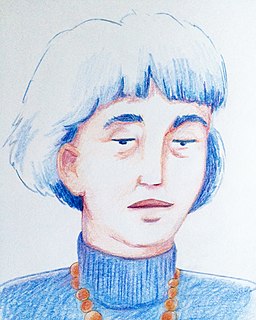A Quote by Charlaine Harris
JB’s mother had taught him early on that appreciated women are happy women.
Related Quotes
We have to nurture our young women and understand the beauty and the strength of being a woman. It's kind of a catch-22: Strength in women isn't appreciated, and vulnerability in women isn't appreciated. It's like, 'What the hell do you do?' What you do is you don't allow anyone to dictate who you are.
I am a feminist. I reject wholeheartedly the way we are taught to perceive women. The beauty of women, how a woman should act or behave. Women are strong and fragile. Women are beautiful and ugly. We are soft-spoken and loud, all at once. There is something mind-controlling about the way we're taught to view women.
Rilke has a very bizarre relationship to women because his mother had an older child, a girl who died when she was a baby. So when Rilke was born she named him Sophie and dressed him as a girl until he was 7. And psychologically, the repercussions of that made him the genius that he is. By the time he was 35, he was continuously falling in love with older women, mother figures, spiritual mothers.
We had early on women having the right to vote, then women in the workforce during WWII, just going back in history, and then we had the higher education of women, and then women more fully participating in the economy and in business, the professions, education, you name the subject... but the missing link has always been: is there quality, affordable healthcare for all women, regardless of what their family situation might be?
There's more empathetic representations than we're used to seeing. I honestly feel like in the early days of Hollywood, women did have those. Women had very traditional roles in society of wife and mother, but when they went to the movies, they got to see women be, like, really cool, amazing characters and femme fatales and all of this. And then there was just this systemic reaction where it was all about, "How do we make money?" And everybody wants to sell things to boys. And then women's entertainment became devalued in a way that I think is disrespectful and hurtful.
Marjan. I have told him tales of good women and bad women, strong women and weak women, shy women and bold women, clever women and stupid women, honest women and women who betray. I'm hoping that, by living inside their skins while he hears their stories, he'll understand over time that women are not all this way or that way. I'm hoping he'll look at women as he does at men-that you must judge each of us on her own merits, and not condemn us or exalt us only because we belong to a particular sex.
I was a child of the women's movement. Everything I had learned was from my mother and my grandmother, who both had a very pioneering spirit. They had to, because they had to change flat tires and paint the house - because, you know, the men didn't come home from the war or whatever else, so women had to do these things.
Blomkvist had indeed had many brief relationships. He knew he was reasonably good-looking, but he had never considered himself exceptionally attractive. But he had often been told that he had something that made women interested in him . . .that he radiated self-confidence and security at the same time, that he had the ability to make women feel at ease. Going to bed with him was not threatening or complicated, but it might be erotically enjoyable. And that, according to Blomkvist, was as it should be.



































